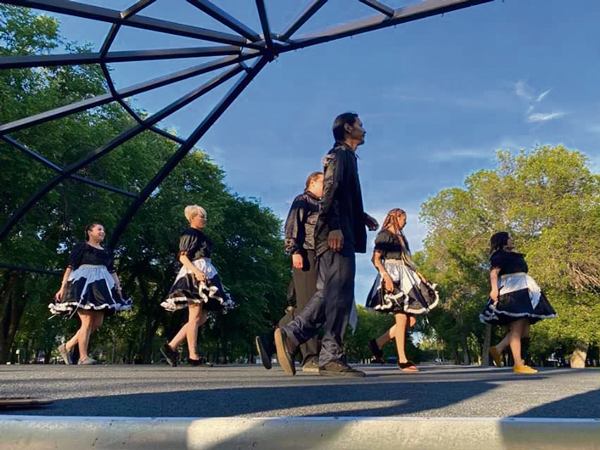
Taking a drive to Prince Albert to practice traditional square dancing and jigging was all Courtney-Dawn Anaquod needed to put a smile on her face again.
She’s from Muscowpetung Saulteax Nation in southern Saskatchewan and is the founder of the Qu’Appelle Valley Square Dancers.
You may have seen the group practicing in Kinsmen Park this past Saturday, Sunday and Monday, shooting a video for this year’s virtual Back to Batoche Days square dancing competition.
Anaquod’s husband passed away in February. When the COVID-19 pandemic hit Saskatchewan just a month later, she felt lonely, isolated and lost.
“I felt like I was grieving alone by myself in the process and having our first practice on Saturday, it just put my heart as ease,” she said.
“Seeing the dancers smiling and all getting together just reminded me that much more of what I’m doing, not only for myself, but for them.”
The Qu’Appelle Valley Square Dancers were booked for shows nearly every weekend this summer. Of course, most of those got cancelled because of public health orders.
But when Back to Batoche Days organizers announced last week that they would still be hosting a virtual event, Anaquod felt a sense of relief.
“I know everyone’s families have been going to Batoche for many, many years,” she said about the dancers.
Anaquod founded the group in 2017, but has known all of the other dancers since they were beginners. She’s the most advanced of them all, dancing for 25 years. Others have varying experience from about five to 15 years.
Eight of them perform at one time; however, the group has several backups in case one of the main dancers can’t make it to a show.
Each of them come from different cities and First Nations and Métis communities, ranging from near Fort Qu’Appelle—where Anaquod lives—to the northern communities of La Ronge and Pelican Narrows.
To practice, the dancers choose a meeting spot. With the dancers wanting to perform for Back to Batoche Days primarily residing in central and northern Saskatchewan, it made sense to practice in Prince Albert—it was the first time they’ve danced together in months.
“There was quite a few people yesterday when we were practicing, just walking and the park. That was another big booster for us,” said Anaquod.
“Seeing those surprises on the people’s faces, that gave us happiness and that pushed us even harder.”
Anaquod’s dad first took her to Back to Batoche Days in 1999, and she’s gone every year since.
Her family has been attending the celebration since nearly its beginning in the 1970s. Many of her family members, including her mushum and kokum, are Batoche championship fiddle players and jiggers.
Anaquod herself has been the championship jigger several times and regained the title in 2019.
Her own kids have been going to Back to Batoche Days since they were born. She always enters her daughter in the jigging contest and, although she doesn’t place, Anaquod can always see the sense of joy on her face.
“I teach her that it’s not just about winning. It’s about showing other kids your talent and other kids who may be scared to go on stage. You’re going to inspire some other little girl to go on stage one day,” she said.
“When she’s grown up and has kids and makes me a grandma, she’ll take her own kids to Batoche.”
Anaquod’s group submitted its video for the square dancing competition on Tuesday. The dancers will also be gathering in Saskatoon in August to shoot a video for the virtual CUMFI Métis Days.
The Métis Nation of Saskatchewan has partnered with National Geographic to bring Back to Batoche Days to people’s homes. The celebration will be streamed this Thursday to Saturday on its website, consisting of cultural demonstrations, dancing, fiddling, cooking classes and Michif language lessons.
This year was supposed to be the 50th anniversary celebration, but that’s been postponed until 2021.

